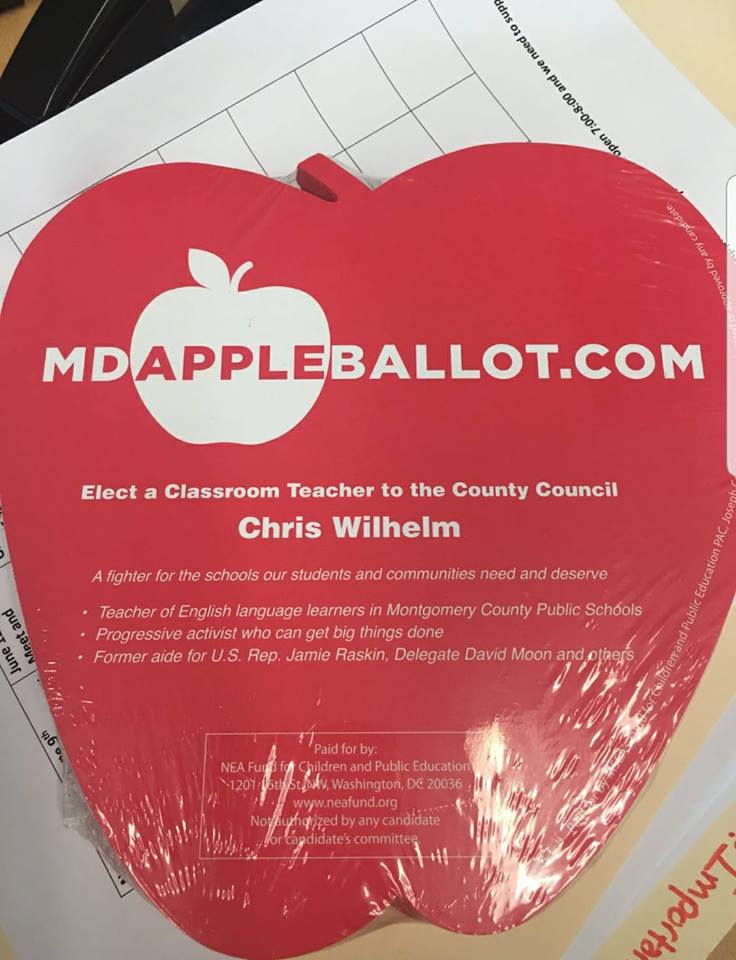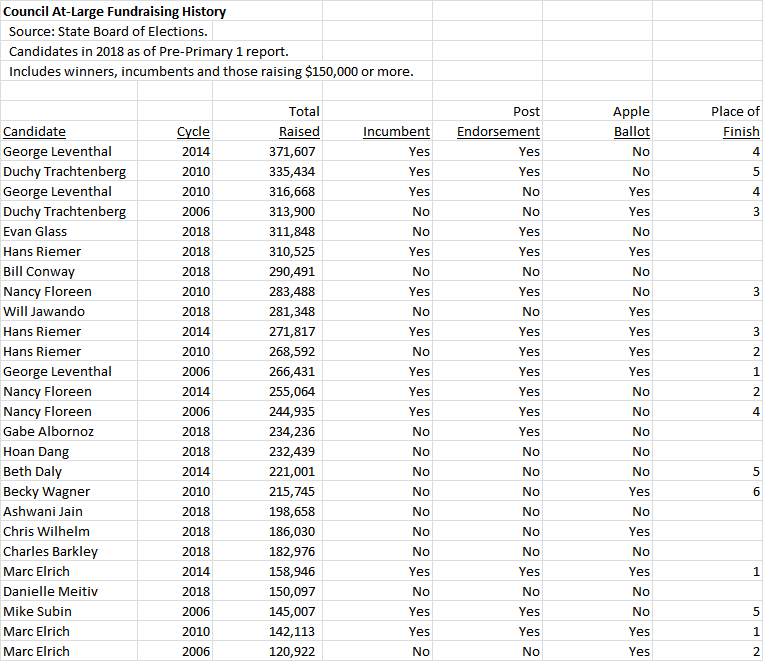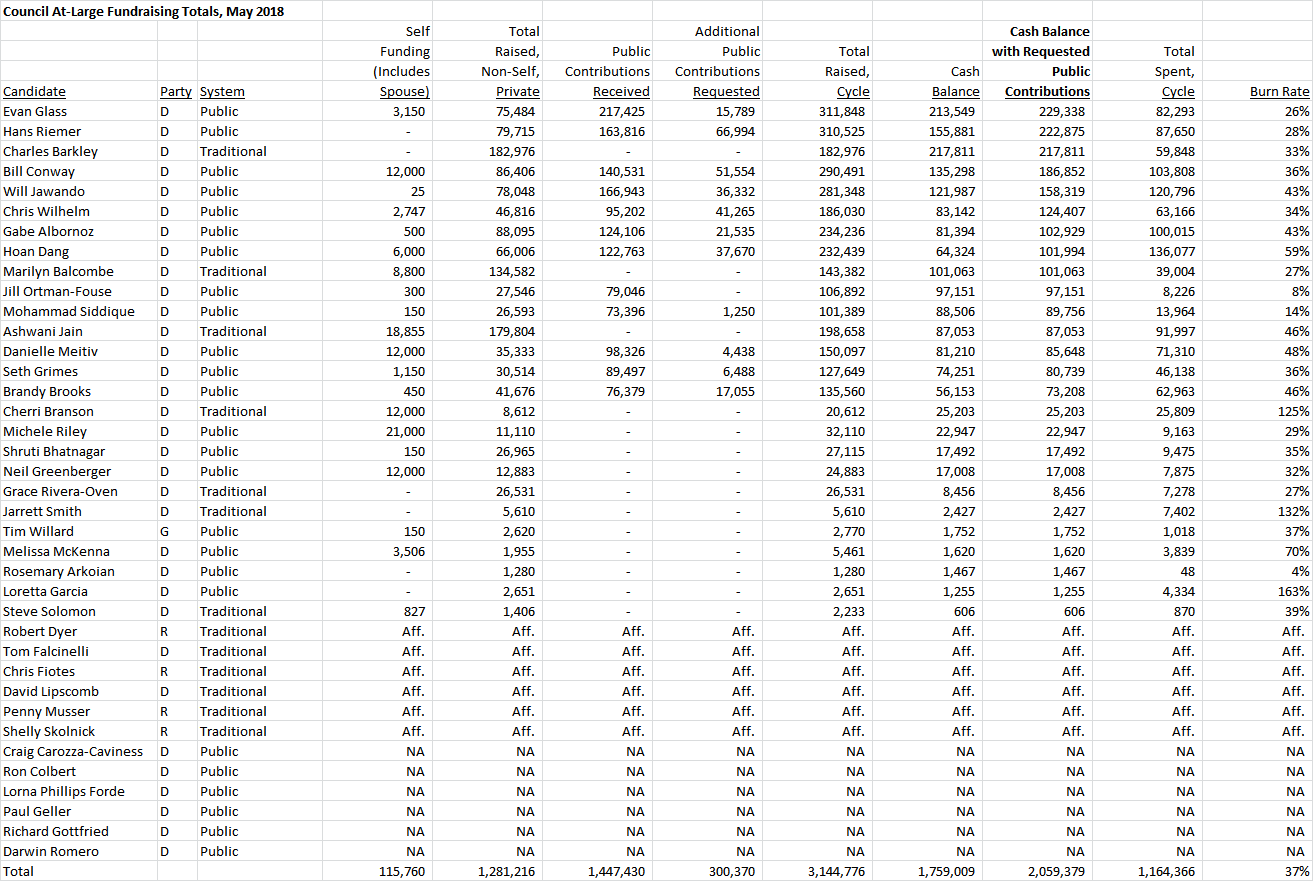By Adam Pagnucco.
County Executive Marc Elrich and his biggest critic, Council Member Hans Riemer, are feuding once again. This time, the subject is affordable housing. Elrich says his new recommended capital budget includes a record sum for affordable housing. Riemer says there are in fact no new resources.
Who is right?
Let’s consider the statements from each of them. First, here is Elrich.
Affordable housing is one of my top priorities. It is vital to our County’s future success. We must maintain and expand our stock of affordable housing and we are taking this critical issue head on in the capital budget. That is why I am recommending we add $132 million for affordable housing to the capital budget over the next six years.
This is a record level of funding for affordable housing projects for our capital budget. These funds will be used by the Affordable Housing Acquisition and Preservation Project to facilitate efforts to preserve existing stock and increase the number of affordable housing units in the County. But that is not all.
In this Capital budget, I am proposing a new Affordable Housing Opportunity Fund to leverage funding from other partners that will support short-term financing while affordable housing developers arrange for permanent project financing.
Here is Riemer’s response.
On affordable housing, I was initially encouraged by the Executive’s speech about increasing funding levels. Indeed, I am intrigued by his proposal to create a new housing preservation fund. However, while he claims to have added more than $132 million in the affordable housing fund, after further examination it became clear that the annual amount is unchanged at $22 million. Under the last Executive, affordable housing funding was only programmed for the first two years of the six year budget, but additional funding was always added in the subsequent years. We need to increase our affordable housing fund to at least $100 million annually. This change in accounting will not result in increased resources. In combination with his resistance to the Council’s affordable housing goals, developed with and agreed upon by all the local governments in Washington region, the County Executive’s housing policy continues to be a matter of serious concern.
These two like each other about as much as Popeye and Bluto. (Which one is Popeye depends on your point of view!) But how can their statements be reconciled?
Since Fiscal Year 2001, the county’s primary affordable housing vehicle has been its Affordable Housing Acquisition and Preservation program, which appears in the county’s capital budget. The program enables the county to buy or renovate, or assist other entities to buy or renovate, affordable housing. It is financed by several sources including but not limited to loan repayments and the county’s Housing Investment Fund (which is mostly supported by recordation taxes).
The capital budget, which includes the Affordable Housing Acquisition and Preservation program, is a six-year budget. In even years (like 2020), it is written anew and in odd years, it is amended. Projects in the capital budget can have up to six different years of funding in them (with more scheduled outside of the budget’s six year horizon). In the past, the affordable housing program has only shown funding for the first two years of the capital budget with zero money programmed in the last four years. But since the capital budget is rewritten every two years with affordable housing money renewed in each successive budget, that has not mattered.
The table below shows funding for the Affordable Housing Acquisition and Preservation program in the last 16 capital budgets. Each budget covers six years. Budgets labeled with an “A” are amended budgets programmed in off years.
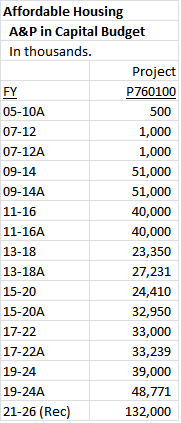
At first glance, Elrich appears to be right. His new recommended capital budget includes $132 million for Affordable Housing Acquisition and Preservation, which is far higher than any previous capital budget. But let’s remember what Riemer said about the annual amount of spending. All the previous six-year budgets included funding during the first two years only. Elrich’s new capital budget shows funding for the Affordable Housing Acquisition and Preservation program in all six years. Riemer is correct: an accounting change caused the apparent increase in this program.
But the story doesn’t end there. Elrich created a new program in the capital budget called the Affordable Housing Opportunity Fund. This program is dedicated to acquiring affordable housing in areas at risk of rent escalation, such as those near the Purple Line and other transit corridors, and is intended to use public funds to leverage private funds in acquiring and preserving affordable housing. This new program provides $10 million in each of the new capital budget’s first two years for this purpose. That money comes from recordation tax premiums which are normally used to finance transportation projects, so it’s not “free” money. But it is more money for affordable housing.
Combining the existing Affordable Housing Acquisition and Preservation program and Elrich’s new Affordable Housing Opportunity Fund, the table below shows the annual expenditures for affordable housing in the capital budget since FY05. Annual expenditures are drawn from the first two years of every amended capital budget with FY21 and FY22 drawn from the executive’s new recommended capital budget.
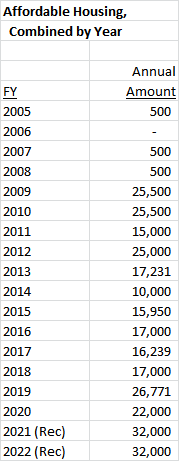
Combining the two programs, Elrich recommends spending more capital money for affordable housing in FY21 and FY22 than any annual expenditure in the preceding published budgets. When adjusting for inflation, Elrich’s FY21 and FY22 spending amounts are roughly equal to the Leggett administration’s peak affordable housing years of FY09 and FY10, so one can quibble about whether Elrich’s spending is truly a record. But when Elrich’s new Affordable Housing Opportunity Fund is included, the first two years of his new budget definitely show an annual increase for affordable housing over the prior budget.
The county’s capital budget has been shrinking due to cutbacks in general obligation bond issuances and declining projected school impact tax receipts. That’s a dire subject for another time. But given the county’s budget difficulties, Elrich’s financial commitment to affordable housing is meaningful. Friends and foes alike should give him credit for it.



